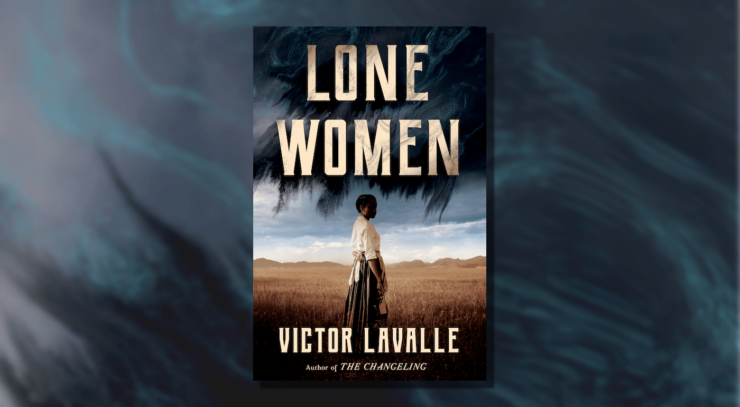Blue skies, empty land—and enough wide-open space to hide a horrifying secret…
We’re thrilled to share an excerpt from Victor LaValle’s Lone Women, a bracing new vision of the American West—publishing March 28th from One World.
Adelaide Henry carries an enormous steamer trunk with her wherever she goes. It’s locked at all times. Because when the trunk opens, people around Adelaide start to disappear.
The year is 1915, and Adelaide is in trouble. Her secret sin killed her parents, forcing her to flee California in a hellfire rush and make her way to Montana as a homesteader. Dragging the trunk with her at every stop, she will become one of the “lone women” taking advantage of the government’s offer of free land for those who can tame it—except that Adelaide isn’t alone. And the secret she’s tried so desperately to lock away might be the only thing that will help her survive the harsh territory.
Crafted by a modern master of magical suspense, Lone Women blends shimmering prose, an unforgettable cast of adventurers who find horror and sisterhood in a brutal landscape, and a portrait of early-twentieth-century America like you’ve never seen. And at its heart is the gripping story of a woman desperate to bury her past—or redeem it.
“I know you.”
Adelaide and Mr. Cole were an hour into their trip before he said these words. The first ones spoken since Adelaide’s farmhouse disappeared behind a bend in the road. She hadn’t minded the quiet.
“Queer folk,” Mr. Cole continued. “That’s what they say about the Henrys.”
Mr. Cole’s horse had become accustomed to the weight. Not comfortable, but accustomed. The bed of Mr. Cole’s buckboard wagon wasn’t large, which meant the trunk hardly had room to shift even as they went uphill or down; a small blessing for the animal. Adelaide wondered at her sympathy for this horse when she had so little for herself.
“Oh yes,” Mr. Cole continued, feeling bolder. He cut his eyes in her direction. “I’m not just talking about round here. They know y’all in Victorville and Allensworth.”
She’d hired this man to take her to the Port of Los Angeles. A twenty-four-mile ride south. And when she got there, she meant to board a ship. She guessed they had another five hours to go. Five more hours of this. The weariness is what made her speak; it certainly wasn’t curiosity.
“And what do they know?” she asked.
He grinned, began a recitation: “Keep to your property. Don’t visit with others. Never speak a word in church.”
“We bring plums every Sunday,” Adelaide offered.
Mr. Cole pinched his lips, but nodded finally. “I’ll give you that much.”
Buy the Book


Lone Women
Adelaide thought her father would’ve been pleased. She could tell Mr. Cole wasn’t the type to give credit for much of anything.
Adelaide looked at her hands. The cuts ran along her palms and most of her fingers. Some of the gouges were quite deep. They’d stopped bleeding but she hadn’t bandaged them. Her hands must’ve looked nearly inhuman. She turned them back over, palms down, when she understood Mr. Cole had glanced her way. The cuts wouldn’t heal for days. Somewhere along the journey she’d better buy gloves.
She tried her best but she couldn’t picture exactly how she’d got the wounds. Not to say she didn’t know the cause—of course she did—but the moment when any one nick or scratch appeared had been scrubbed from her mind. There was dinner yesterday evening and the sun coming up at dawn. The time in between had disappeared. It was as if she had materialized in the kitchen, her hands covered in cuts, and on the counter there were two jars filled with gasoline. She didn’t even remember filling them.
I burned the evidence.
Adelaide caught herself, a hand literally thrown over her lips. For a moment she thought she’d said the words out loud. But no, she hadn’t, she could tell because Mr. Cole still sat there jawing about her family and their reputation in the Valley. His lips were moving—no doubt he felt bold enough to insult her family openly now—but she couldn’t hear him. Instead she heard only herself. Every tongue shall confess.
She kept her hand over her mouth because she wasn’t sure what might come out. The words, or the last meal in her stomach.
“You feeling sick?” Mr. Cole asked.
She nodded and looked to him with a tight grin.
“Well, if something comes up,” he said, looking toward the horizon, “make sure you spill over the side. I keep my wagon clean.”
Twenty-four miles took half a day. Half a day with Mr. Cole. Imagine how tedious that sounds. Then double it. A funny thing happens when a man thinks he has a woman’s company all to himself. He may show a face to her that he would keep hidden if there were even one more person around. He speaks from his secret self.
And even though Adelaide had been part of a family that largely kept to itself, she’d gone back and forth to Victorville and Allensworth, hauling plums to be sold. At the markets, or along the roads, she’d encountered many men by herself. The things they said. When she began making the trips alone, she wouldn’t recount the words to her mother or her father. They became like a small bag of stones she carried in one hand. A bother. A nuisance. They made it more difficult to do the necessary things, big or small. She’d travel farther just to avoid certain roads. So Mr. Cole spent much of the journey talking badly about her family and did it with impunity because who else was around to shame him?
As the trip continued, Adelaide wondered what it would feel like to bring a bag of rocks down on this old man’s head. By about the fourth hour, she passed the time casually imagining all the ways she might murder this spiteful man. Like right now, one hard push off the wagon and he might break his neck. She watched him and the fantasy made her grin.
But then he looked directly at her and said, “What you smiling about, girl?”
And the moment passed.
That’s twice she’d contemplated killing him. There were people who would judge her harshly for her thoughts. Those people, she felt, could fuck themselves.
The wagon ride continued.
There was some confusion as they approached Los Angeles. Turns out the Port of Los Angeles was located in a town called San Pedro.
Mr. Cole learned this at a feed store along the way. His exact words were, Well, that’s some foolishness.
If the door to the feed store hadn’t been open, Adelaide wouldn’t have overheard the news about the error. Mr. Cole got in the wagon and pretended like he hadn’t made any mistake at all. Every tongue shall not confess, apparently.
Mr. Cole backtracked for half an hour and soon set them on the proper road. Adelaide said nothing. Getting to the Port was all that mattered. She had a ship to catch, and now she worried she might not make it.
When they finally reached San Pedro, the city shrank them. Both Adelaide and Mr. Cole felt reduced. On Beacon Street they passed the San Pedro Bank Building; its clock tower stood four stories tall. It cast a shadow that crossed the road. It seems foolish, but when they rode through the shadow, Adelaide shivered. Even Mr. Cole stopped talking. She’d seen plenty of grain silos that size, but never a clock.
The whole town was wired for electricity. A streetcar rumbled through the intersection carrying twenty-five people, maybe more. Adelaide and Mr. Cole sat in the wagon and watched the streetcar rattle past. A few of the passengers looked at her without seeing her. They looked through her, past her. They didn’t know her. Didn’t know her family. She was unknown. To some this might sound terrible, but that moment was the first time Adelaide Henry realized she might escape. What if she skipped all the rest and settled here?
But six hours from Lucerne Valley wasn’t hardly far enough to go. And besides, Mr. Cole, this mouthy coot, he’d know where she’d settled. A man like this savored gossip the way others did her father’s plums. When the streetcar passed, Mr. Cole looked to her.
“Keep going?” he asked.
For him, the Lucerne Valley was welcome, and welcoming. Had she ever felt that way?
“We’re almost there, Mr. Cole.” Adelaide gestured forward. “Let’s keep on.”
He studied her face, as if memorizing something.
He clicked his tongue and with a snort his horse took two steps forward.
The wagon wheels creaked. The trunk shifted as much as it could in the small space behind the spring seat. Adelaide reached back and placed a hand on the trunk as if it might leap from the wagon and flee. As if her touch could calm it.
From Lone Women by Victor LaValle, copyright © 2023 by Victor LaValle. Published by One World, an imprint of Random House, a division of Penguin Random House LLC. All rights reserved.










